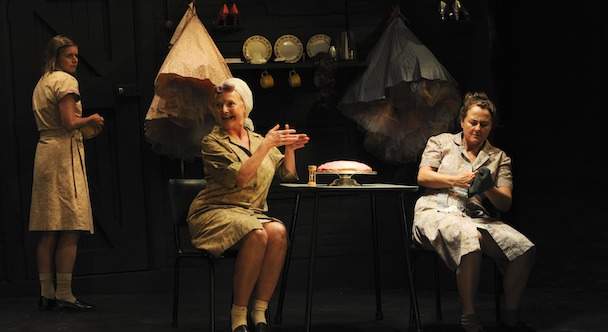The New Electric Ballroom – Griffin Independent and Siren Theatre Co
You know that moment that broke your heart so much you've been doomed to recall and repeat it? This is that, to the extreme.
Overview
Cakes get smashed, biscuits are catapulted, lipstick is smeared and someone urinates symptoms of the trapped and fearful mind.
Sisters Brida (Odile LeClezio), Ada (Jane Phegan) and Clara (Genevieve Mooy) are holed up in a small cottage, shielding themselves from the harsh outside world, a seaside village in Western Ireland where the streets are narrow and the houses lean in on one another so they squeeze you. The suffocating pressure of the town is felt as the cast is packed onto the tiny tin-box stage.
In their bland, curtain-fabric dresses and matronly buns and rollers, the sisters play with the innate Irish aptitude for storytelling, delivered with a whipper-snipper race of words down a rabbit warren of memories. We are left reeling, dizzy and ill after being dragged through spirals of rote-learned stories: Brida and Clara's single night of disappointment at the New Electric Ballroom, a virginity never lost and the realisation at 40 of never being properly kissed (only once mauled in the car park by a fishmonger). Their dashed hopes apparently justify their self-imprisonment.
With The New Electric Ballroom, playwright Enda Walsh (The Walworth Farce) is successfully externalising the cyclic thought patterns of madness that whine at us all, that we carry around inside our skulls but hate to admit ownership of. The message comes out loud and clear; it's just a question of whether you want to sit through it blaring for 90 minutes.
Their memories, madness and desperate wailing for cups of tea are pleasantly interrupted by the mad fishmonger Patsy (Justin Smith), who delivers fresh fish and comic streams of consciousness on a daily basis. Though he bores them, Patsy surprises all, exchanging his humble fisherman clothes for a flashy gold Elvis suit, crooning a love song to Ada and beckoning her to join him in the outside world.
Knowing what we know of the Irish literary lineage, however, this note of optimism can't be expected to hold. The proffering of a slice of delicious coffee cake in conclusion was a decent compensation but no tea!





